- Home
- Jack London
The Call of the Wild and Selected Stories Page 12
The Call of the Wild and Selected Stories Read online
Page 12
“Gee! Gee!” the men cried, each in turn, as their sleds abruptly left the main trail, heeling over on single runners like luggers on the wind.
Then came a hundred yards’ dash to the lighted parchment window, which told its own story of the home cabin, the roaring Yukon stove, and the steaming pots of tea. But the home cabin had been invaded. Three-score huskies chorused defiance, and as many furry forms precipitated themselves upon the dogs which drew the first sled. The door was flung open, and a man, clad in the scarlet tunic of the Northwest Police, waded knee-deep among the furious brutes, calmly and impartially dispensing soothing justice with the butt end of a dog whip. After that the men shook hands; and in this wise was Malemute Kid welcomed to his own cabin by a stranger.
Stanley Prince, who should have welcomed him, and who was responsible for the Yukon stove and hot tea aforementioned, was busy with his guests. There were a dozen or so of them, as nondescript a crowd as ever served the Queen in the enforcement of her laws or the delivery of her mails. They were of many breeds, but their common life had formed of them a certain type—a lean and wiry type, with trail-hardened muscles, and sun-browned faces, and untroubled souls which gazed frankly forth, clear-eyed and steady. They drove the dogs of the Queen, wrought fear in the hearts of her enemies, ate of her meager fare, and were happy. They had seen life, and done deeds, and lived romances; but they did not know it.
And they were very much at home. Two of them were sprawled upon Malemute Kid’s bunk, singing chansons which their French forebears sang in the days when first they entered the Northwest land and mated with its Indian women. Bettles’ bunk had suffered a similar invasion, and three or four lusty voyageurs worked their toes among its blankets as they listened to the tale of one who had served on the boat brigade with Wolseley when he fought his way to Khartoum. And when he tired, a cowboy told of courts and kings and lords and ladies he had seen when Buffalo Bill toured the capitals of Europe. In a corner two half-breeds, ancient comrades in a lost campaign, mended harnesses and talked of the days when the Northwest flamed with insurrection and Louis Riel was king.
Rough jests and rougher jokes went up and down, and great hazards by trail and river were spoken of in the light of commonplaces, only to be recalled by virtue of some grain of humor or ludicrous happening. Prince was led away by these uncrowned heroes who had seen history made, who regarded the great and the romantic as but the ordinary and the incidental in the routine of life. He passed his precious tobacco among them with lavish disregard, and rusty chains of reminiscence were loosened, and forgotten odysseys resurrected for his especial benefit.
When conversation dropped and the travelers filled the last pipes and unlashed their tight-rolled sleeping furs, Prince fell back upon his comrade for further information.
“Well, you know what the cowboy is,” Malemute Kid answered, beginning to unlace his moccasins; “and it’s not hard to guess the British blood in his bed partner. As for the rest, they’re all children of the coureurs du bois, mingled with God knows how many other bloods. The two turning in by the door are the regulation ‘breeds’ or Boisbrûles. That lad with the worsted breech scarf—notice his eyebrows and the turn of his jaw—shows a Scotchman wept in his mother’s smoky tepee. And that handsome-looking fellow putting the capote under his head is a French half-breed—you heard him talking; he doesn’t like the two Indians turning in next to him. You see, when the ‘breeds’ rose under Riel the full-bloods kept the peace, and they’ve not lost much love for one another since.”
“But I say, what’s that glum-looking fellow by the stove? I’ll swear he can’t talk English. He hasn’t opened his mouth all night.”
“You’re wrong. He knows English well enough. Did you follow his eyes when he listened? I did. But he’s neither kith nor kin to the others. When they talked their own patois you could see he didn’t understand. I’ve been wondering myself what he is. Let’s find out.”
“Fire a couple of sticks into the stove!” Malemute Kid commanded, raising his voice and looking squarely at the man in question.
He obeyed at once.
“Had discipline knocked into him somewhere,” Prince commented in a low tone.
Malemute Kid nodded, took off his socks, and picked his way among recumbent men to the stove. There he hung his damp footgear among a score or so of mates.
“When do you expect to get to Dawson?” he asked tentatively.
The man studied him a moment before replying. “They say seventy-five mile. So? Maybe two days.”
The very slightest accent was perceptible, while there was no awkward hesitancy or groping for words.
“Been in the country before?”
“No.”
“Northwest Territory?”
“Yes.”
“Born there?”
“No.”
“Well, where the devil were you born? You’re none of these.” Malemute Kid swept his hand over the dog drivers, even including the two policemen who had turned into Prince’s bunk. “Where did you come from? I’ve seen faces like yours before, though I can’t remember just where.”
“I know you,” he irrelevantly replied, at once turning the drift of Malemute Kid’s questions.
“Where? Ever see me?”
“No; your partner, him priest, Pastolik, long time ago. Him ask me if I see you, Malemute Kid. Him give me grub. I no stop long. You hear him speak ’bout me?”
“Oh! you’re the fellow that traded the otter skins for the dogs?”
The man nodded, knocked out his pipe, and signified his disinclination for conversation by rolling up in his furs. Malemute Kid blew out the slush lamp and crawled under the blankets with Prince.
“Well, what is he?”
“Don’t know—turned me off, somehow, and then shut up like a clam. But he’s a fellow to whet your curiosity. I’ve heard of him. All the coast wondered about him eight years ago. Sort of mysterious, you know. He came down out of the North, in the dead of winter, many a thousand miles from here, skirting Bering Sea and traveling as though the devil were after him. No one ever learned where he came from, but he must have come far. He was badly travel-worn when he got food from the Swedish missionary on Golofnin Bay and asked the way south. We heard of this afterward. Then he abandoned the shore line, heading right across Norton Sound. Terrible weather, snowstorms and high wind, but he pulled through where a thousand other men would have died, missing St. Michael’s and making the land at Pastolik. He’d lost all but two dogs, and was nearly gone with starvation.
“He was so anxious to go on that Father Roubeau fitted him out with grub; but he couldn’t let him have any dogs, for he was only waiting my arrival to go on a trip himself. Mr. Ulysses knew too much to start on without animals, and fretted around for several days. He had on his sled a bunch of beautifully cured otter skins, sea otters, you know, worth their weight in gold. There was also at Pastolik an old Shylock of a Russian trader, who had dogs to kill. Well, they didn’t dicker very long, but when the Strange One headed south again, it was in the rear of a spanking dog team. Mr. Shylock, by the way, had the otter skins. I saw them, and they were magnificent. We figured it up and found the dogs brought him at least five hundred apiece. And it wasn’t as if the Strange One didn’t know the value of sea otter; he was an Indian of some sort, and what little he talked showed he’d been among white men.
“After the ice passed out of the sea, word came up from Nunivak Island that he’d gone in there for grub. Then he dropped from sight, and this is the first heard of him in eight years. Now where did he come from? and what was he doing there? and why did he come from there? He’s Indian, he’s been nobody knows where, and he’s had discipline, which is unusual for an Indian. Another mystery of the North for you to solve, Prince.”
“Thanks awfully, but I’ve got too many on hand as it is,” he replied.
Malemute Kid was already breathing heavily; but the young mining engineer gazed straight up through the thick darkness, waiting for the
strange orgasm which stirred his blood to die away. And when he did sleep, his brain worked on, and for the nonce he, too, wandered through the white unknown, struggled with the dogs on endless trails, and saw men live, and toil, and die like men.
The next morning, hours before daylight, the dog drivers and policemen pulled out for Dawson. But the powers that saw to Her Majesty’s interests and ruled the destinies of her lesser creatures gave the mailmen little rest, for a week later they appeared at Stuart River, heavily burdened with letters for Salt Water. However, their dogs had been replaced by fresh ones; but, then, they were dogs.
The men had expected some sort of a layover in which to rest up; besides, this Klondike was a new section of the Northland, and they had wished to see a little something of the Golden City where dust flowed like water and dance halls rang with never-ending revelry. But they dried their socks and smoked their evening pipes with much the same gusto as on their former visit, though one or two bold spirits speculated on desertion and the possibility of crossing the unexplored Rockies to the east, and thence, by the Mackenzie Valley, of gaining their old stamping grounds in the Chipewyan country. Two or three even decided to return to their homes by that route when their terms of service had expired, and they began to lay plans forthwith, looking forward to the hazardous undertaking in much the same way a city-bred man would to a day’s holiday in the woods.
He of the Otter Skins seemed very restless, though he took little interest in the discussion, and at last he drew Malemute Kid to one side and talked for some time in low tones. Prince cast curious eyes in their direction, and the mystery deepened when they put on caps and mittens and went outside. When they returned, Malemute Kid placed his gold scales on the table, weighed out the matter of sixty ounces, and transferred them to the Strange One’s sack. Then the chief of the dog drivers joined the conclave, and certain business was transacted with him. The next day the gang went on upriver, but He of the Otter Skins took several pounds of grub and turned his steps back toward Dawson.
“Didn’t know what to make of it,” said Malemute Kid in response to Prince’s queries; “but the poor beggar wanted to be quit of the service for some reason or other—at least it seemed a most important one to him, though he wouldn’t let on what. You see, it’s just like the army: he signed for two years, and the only way to get free was to buy himself out. He couldn’t desert and then stay here, and he was just wild to remain in the country. Made up his mind when he got to Dawson, he said; but no one knew him, hadn’t a cent, so I was the only one he’d spoken two words with. So he talked it over with the lieutenant-governor, and made arrangements in case he could get the money from me—loan, you know. Said he’d pay back in the year, and, if I wanted, would put me onto something rich. Never’d seen it, but knew it was rich.
“And talk! why, when he got me outside he was ready to weep. Begged and pleaded; got down in the snow to me till I hauled him out of it. Palavered around like a crazy man. Swore he’s worked to this very end for years and years, and couldn’t bear to be disappointed now. Asked him what end, but he wouldn’t say. Said they might keep him on the other half of the trail and he wouldn’t get to Dawson in two years, and then it would be too late. Never saw a man take on so in my life. And when I said I’d let him have it, had to yank him out of the snow again. Told him to consider it in the light of a grubstake. Think he’d have it? No sir! Swore he’d give me all he found, make me rich beyond the dreams of avarice, and all such stuff. Now a man who puts his life and time against a grubstake ordinarily finds it hard enough to turn over half of what he finds. Something behind all this, Prince; just you make a note of it. We’ll hear of him if he stays in the country—”
“And if he doesn’t?”
“Then my good nature gets a shock, and I’m sixty-some odd ounces out.”
The cold weather had come on with the long nights, and the sun had begun to play his ancient game of peekaboo along the southern snow line ere aught was heard of Malemute Kid’s grubstake. And then, one bleak morning in early January, a heavily laden dog train pulled into his cabin below Stuart River. He of the Otter Skins was there, and with him walked a man such as the gods have almost forgotten how to fashion. Men never talked of luck and pluck and five-hundred-dollar dirt without bringing in the name of Axel Gunderson; nor could tales of nerve or strength or daring pass up and down the campfire without the summoning of his presence. And when the conversation flagged, it blazed anew at mention of the woman who shared his fortunes.
As has been noted, in the making of Axel Gunderson the gods had remembered their old-time cunning and cast him after the manner of men who were born when the world was young. Full seven feet he towered in his picturesque costume which marked a king of Eldorado. His chest, neck, and limbs were those of a giant. To bear his three hundred pounds of bone and muscle, his snowshoes were greater by a generous yard than those of other men. Roughhewn, with rugged brow and massive jaw and unflinching eyes of palest blue, his face told the tale of one who knew but the law of might. Of the yellow of ripe corn silk, his frost-encrusted hair swept like day across the night and fell far down his coat of bearskin. A vague tradition of the sea seemed to cling about him as he swung down the narrow trail in advance of the dogs; and he brought the butt of his dog whip against Malemute Kid’s door as a Norse sea rover, on southern foray, might thunder for admittance at the castle gate.
Prince bared his womanly arms and kneaded sour-dough bread, casting, as he did so, many a glance at the three guests—three guests the like of which might never come under a man’s roof in a lifetime. The Strange One, whom Malemute Kid had surnamed Ulysses, still fascinated him; but his interest chiefly gravitated between Axel Gunderson and Axel Gunderson’s wife. She felt the day’s journey, for she had softened in comfortable cabins during the many days since her husband mastered the wealth of frozen pay streaks, and she was tired. She rested against his great breast like a slender flower against a wall, replying lazily to Malemute Kid’s good-natured banter, and stirring Prince’s blood strangely with an occasional sweep of her deep, dark eyes. For Prince was a man, and healthy, and had seen few women in many months. And she was older than he, and an Indian besides. But she was different from all native wives he had met: she had traveled—had been in his country among others, he gathered from the conversation; and she knew most of the things the women of his own race knew, and much more that it was not in the nature of things for them to know. She could make a meal of sun-dried fish or a bed in the snow; yet she teased them with tantalizing details of many-course dinners, and caused strange internal dissensions to arise at the mention of various quondam dishes which they had well-nigh forgotten. She knew the ways of the moose, the bear, and the little blue fox, and of the wild amphibians of the Northern seas; she was skilled in the lore of the woods and the streams, and the tale writ by man and bird and beast upon the delicate snow crust was to her an open book; yet Prince caught the appreciative twinkle in her eye as she read the Rules of the Camp. These rules had been fathered by the Unquenchable Bettles at a time when his blood ran high, and were remarkable for the terse simplicity of their humor. Prince always turned them to the wall before the arrival of ladies; but who could suspect that this native wife—Well, it was too late now.
This, then, was the wife of Axel Gunderson, a woman whose name and fame had traveled with her husband’s, hand in hand, through all the Northland. At table, Malemute Kid baited her with the assurance of an old friend, and Prince shook off the shyness of first acquaintance and joined in. But she held her own in the unequal contest, while her husband, slower in wit, ventured naught but applause. And he was very proud of her; his every look and action revealed the magnitude of the place she occupied in his life. He of the Otter Skins ate in silence, forgotten in the merry battle; and long ere the others were done he pushed back from the table and went out among the dogs. Yet all too soon his fellow travelers drew on their mittens and parkas and followed him.
There had been no snow for many da
ys, and the sleds slipped along the hard-packed Yukon trail as easily as if it had been glare ice. Ulysses led the first sled; with the second came Prince and Axel Gunderson’s wife; while Malemute Kid and the yellow-haired giant brought up the third.
“It’s only a hunch, Kid,” he said, “but I think it’s straight. He’s never been there, but he tells a good story, and shows a map I heard of when I was in the Kootenay country years ago. I’d like to have you go along; but he’s a strange one, and swore point-blank to throw it up if anyone was brought in. But when I come back you’ll get first tip, and I’ll stake you next to me, and give you a half share in the town site besides.
“No! no!” he cried, as the other strove to interrupt. “I’m running this, and before I’m done it’ll need two heads. If it’s all right, why, it’ll be a second Cripple Creek, man; do you hear?—a second Cripple Creek! It’s quartz, you know, not placer; and if we work it right we’ll corral the whole thing—millions upon millions. I’ve heard of the place before, and so have you. We’ll build a town—thousands of workmen—good waterways—steamship lines—big carrying trade—light-draught steamers for head reaches—survey a railroad, perhaps—sawmills—electric-light plant—do our own banking—commercial company—syndicate—Say! just you hold your hush till I get back!”
The sleds came to a halt where the trail crossed the mouth of Stuart River. An unbroken sea of frost, its wide expanse stretched away into the unknown east. The snowshoes were withdrawn from the lashings of the sleds. Axel Gunderson shook hands and stepped to the fore, his great webbed shoes sinking a fair half yard into the feathery surface and packing the snow so the dogs should not wallow. His wife fell in behind the last sled, betraying long practice in the art of handling the awkward footgear. The stillness was broken with cheery farewells; the dogs whined; and He of the Otter Skins talked with his whip to a recalcitrant wheeler.

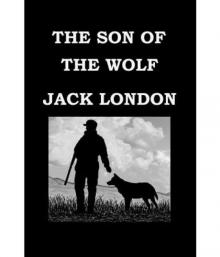 The Son of the Wolf
The Son of the Wolf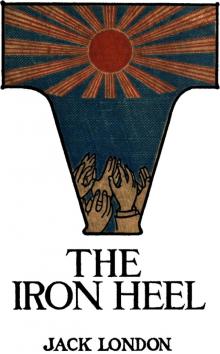 The Iron Heel
The Iron Heel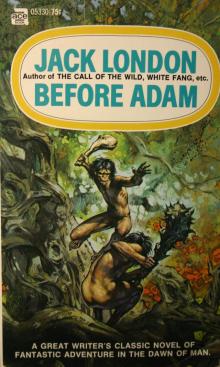 Before Adam
Before Adam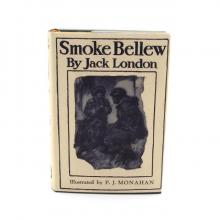 Smoke Bellew
Smoke Bellew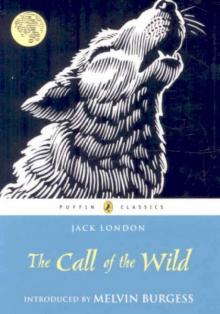 The Call of the Wild
The Call of the Wild The Valley of the Moon Jack London
The Valley of the Moon Jack London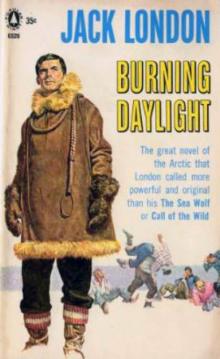 Burning Daylight
Burning Daylight The Sea Wolf
The Sea Wolf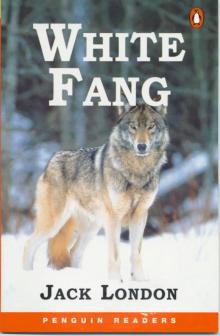 White Fang
White Fang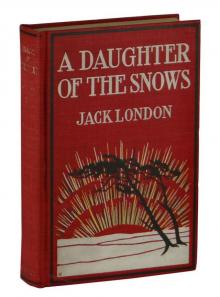 A Daughter of the Snows
A Daughter of the Snows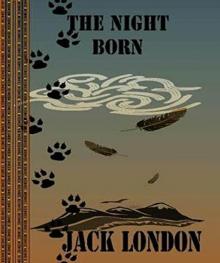 The Night-Born
The Night-Born A Son Of The Sun
A Son Of The Sun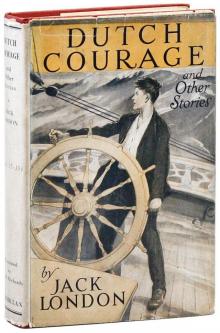 Dutch Courage and Other Stories
Dutch Courage and Other Stories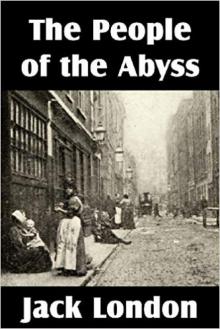 The People of the Abyss
The People of the Abyss Michael, Brother of Jerry
Michael, Brother of Jerry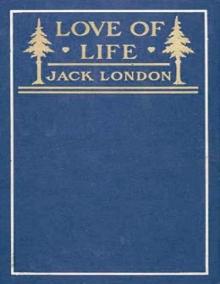 Love of Life, and Other Stories
Love of Life, and Other Stories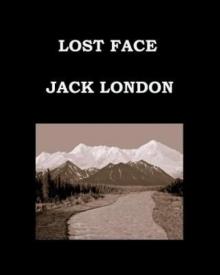 Lost Face
Lost Face The Road
The Road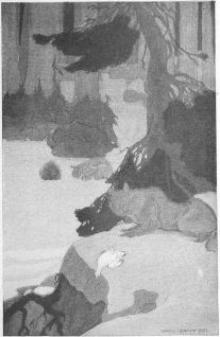 Love of Life
Love of Life The Turtles of Tasman
The Turtles of Tasman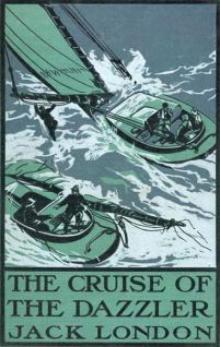 The Cruise of The Dazzler
The Cruise of The Dazzler The Heathen
The Heathen The Scab
The Scab The Faith of Men
The Faith of Men Adventure
Adventure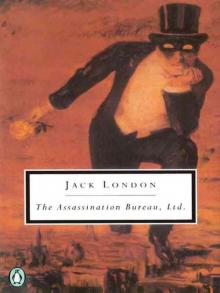 The Assassination Bureau, Ltd.
The Assassination Bureau, Ltd.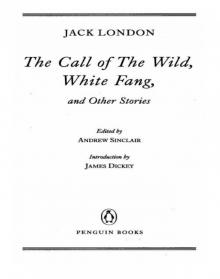 The Call of the Wild, White Fang, and Other Stories
The Call of the Wild, White Fang, and Other Stories The Call of the Wild and Selected Stories
The Call of the Wild and Selected Stories Jerry of the Islands
Jerry of the Islands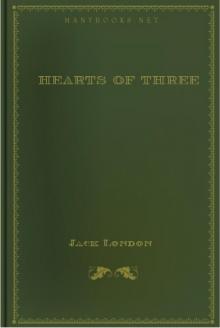 Hearts of Three
Hearts of Three The House of Pride
The House of Pride Moon-Face and Other Stories
Moon-Face and Other Stories Children of the Frost
Children of the Frost South Sea Tales
South Sea Tales The Strength of the Strong
The Strength of the Strong The Jacket (The Star-Rover)
The Jacket (The Star-Rover) The Little Lady of the Big House
The Little Lady of the Big House John Barleycorn
John Barleycorn ADaugter of Snows
ADaugter of Snows The Mutiny of the Elsinore
The Mutiny of the Elsinore Northland Stories
Northland Stories Tales of the Fish Patrol
Tales of the Fish Patrol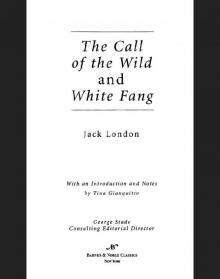 Call of the Wild and White Fang (Barnes & Noble Classics Series)
Call of the Wild and White Fang (Barnes & Noble Classics Series) The Valley of the Moon
The Valley of the Moon The Cruise of the Snark
The Cruise of the Snark The Game
The Game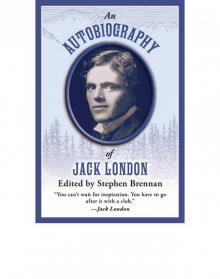 An Autobiography of Jack London
An Autobiography of Jack London